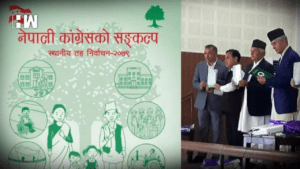Nepali Congress Promises To Resolve Border Issues With India In Its Election Manifesto

Nepali Congress (NC) in its manifesto has stated that the issues of Kalapani, Lipulekh and Limpiyadhura would be resolved through diplomatic means as it makes the promises to the voters ahead of the election Kathmandu: The Nepali Congress, the largest party in Nepal has promised to resolve border issues with…
The post appeared first on .


Nepali Congress (NC) in its manifesto has stated that the issues of Kalapani, Lipulekh and Limpiyadhura would be resolved through diplomatic means as it makes the promises to the voters ahead of the election
Kathmandu: The Nepali Congress, the largest party in Nepal has promised to resolve border issues with India through diplomatic channels as it unveiled the election manifesto for November 20 general election.
Nepali Congress (NC) in its manifesto has stated that the issues of Kalapani, Lipulekh and Limpiyadhura would be resolved through diplomatic means as it makes the promises to the voters ahead of the election which lies 3 weeks ahead. “With India, the border issues in Susta, Kalapani, Lipulekh and Limpiyadura would be resolved through the diplomatic channels. Likewise, the issues with China on the Northern border of Humla also would be resolved through diplomatic dialogue. In the latest round of visits to India Prime Minister Deuba also raised the issues of border and presented forward the stand of Nepal with the Indian government,” the ninth page of the total 56 paged document stated.
Party president and Prime Minister of the incumbent caretaker government Sher Bahadur Deuba, office-bearers and manifesto preparation committee members made the election manifesto public amid a function at the party central office on Saturday.
The 41-member manifesto preparation committee of the ruling largest party in terms of last parliamentary seats was led by party general secretary Bishwa Prakash Sharma. It took about a month for the committee to prepare the political document which was drafted incorporating experts like Swarnim Wagle and Geja Sharma Wagle, among others.
In the manifesto, the party also has pledged not to take an undemocratic and unconstitutional step such as the House dissolution.
The 52-page document is divided into 5 chapters titled contemporary politics and national issues, seven decades of the history: the long journey of democracy, a roadmap of a prosperous Nepal, strengthening of federalism and provincial governments, sectorial priorities and the party’s commitment.
The main slogan of the manifesto is “Protection of the Constitution, Stability and the Firm Foundation for Development: The next government under the leadership of the Nepali Congress”.
Nepal in 2020, amended the constitution incorporating a new political and administrative map in the preamble constitution. The new map included the tri-junction of Limpiyadhura, Kalapani and Lipulekh which has remained a disputed area between Nepal and India.
Nepal’s updated map prepared to incorporate the missing territories was submitted to the Ministry of Land Management by the Department of Survey which claims to have taken an accurate scale, projection and coordinate system. It was publicly released on May 20, 2020 after a go-ahead signal from the Cabinet meeting on May 18 the same year.
The department has collected a map drawn during the Treaty of Sugauli, another brought from London, receipts of payment of land revenues and the order issued by the then Prime Minister Chandra Shumsher, as evidence to claim on the land belongs to Nepal.
The earlier map issued in 2032 BS had left Gunji, Nabhi and Kuri villages which now have been included in the lately revised map adding 335 square kilometres of its land.
Tensions between New Delhi and Kathmandu last year arose after the issuance of the political map by Nepal in mid of May including the tri-junction, which India earlier had included in its November 2019 issued map.
Diplomatic ties between the nations severed further after the inauguration of a road linking Kailash Mansarovar via Lipulekh on May 8, 2020, after which Nepal handed over a diplomatic note to India objecting to the move.
Also Read:
Prior to the handover of the diplomatic note, Nepal also had strongly objected to India’s unilateral move of constructing the road. Following a strong objection from Nepal, India’s Ministry of External Affairs (MEA) had said the road going through Uttarakhand’s Pithoragarh district “lies completely within the territory of India”.
Nepal said it has “consistently maintained” that as per the Sugauli Treaty (1816), “all the territories east of Kali (Mahakali) river, including Limpiyadhura, Kalapani and Lipu Lekh, belong to Nepal.”Indian Defence Ministry had said the Border Road Organisation (BRO) in Uttarakhand has connected the Kailash Mansarovar route to Lipulekh pass, which will provide connectivity to border villages and security forces.
Following a strong objection from Nepal, India’s Ministry of External Affairs (MEA) had said the road going through Uttarakhand’s Pithoragarh district “lies completely within the territory of India.”
(Except for the headline, this story has not been edited by HW News staff and is published from a syndicated feed.)
The post Nepali Congress Promises To Resolve Border Issues With India In Its Election Manifesto appeared first on HW News English.


